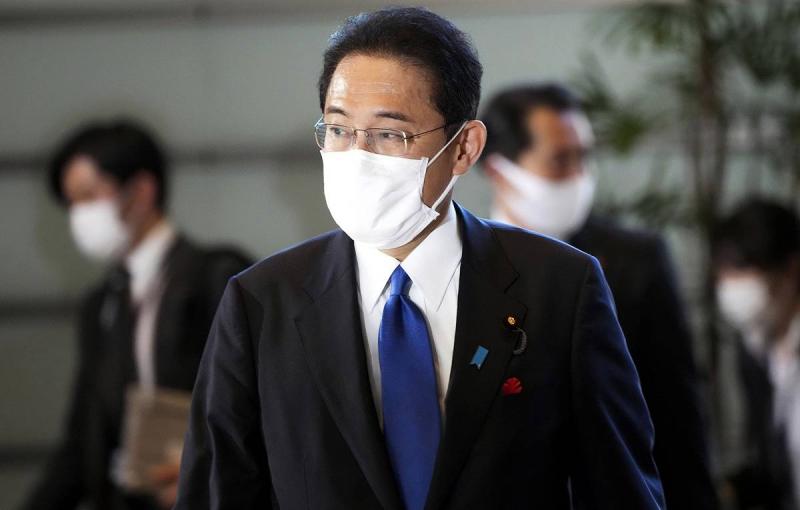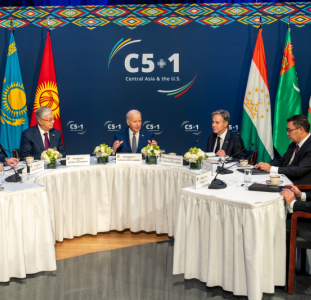
© AP Photo/Eugene Hoshiko
Fumio Kishida does not seem in the best of moods as he celebrates the anniversary of being Prime Minister of Japan. October 4 marked twelve months since he took over the Cabinet to replace Yoshihide Suga, who failed to stand up to accusations of having pursued a weak anti-covid policy, including the decision to hold the Tokyo Summer Olympics amid the pandemic. Now, the time has come for the current PM to fight his way against the growing number of challengers.
A survey by the Yomiuri Shimbun newspaper reveals that people disapproving of Kishida cabinet’s performance have for the first time outnumbered its endorsers. Actually, a fall of the kind is by no means unusual for Japan, but the country’s economic and political situation does portend an approaching crisis. There is talk in the media about an early parliamentary election as a drastic remedy to enhance the ruling party’s stature.
First of all, growing prices are the talk of the town. Over 6,000 foodstuffs and beverages have went up in price, with the annual household burden having increased by almost 70,000 yen (about $500), pundits say.
Things are even more complicated as regards electricity tariffs showing a 30% annual growth. The yen’s meltdown slams up the cost of energy resources at a time when Japan is 90 percent dependent on their imports. Media reports and official statements, including Kishida’s, feature the internationally recognized thesis that price issues are brought about by the Russian-instigated Ukraine crisis. At the same time, the issue of restoring atomic generation is gaining newfound relevance, as it provides for nearly 30 percent of the country’s power supplies. It was curtailed a decade ago after the Fukushima NPP accident, as well as in compliance with the global green energy trend.
Second, the so-called Unification Church scandal continues unabated at home. It appeared in 1954 in South Korea, and soon gained international fame thanks to the good graces of the Korean and foreign authorities. In particular, it opened branches in the USA and Japan to arrange, among other things, collective weddings for thousands of people. And still, the reason for government acceptance is the organization’s outright anti-communist sentiment, which the Japanese authorities notably used to counteract the country’s Communist Party.
After 1991, this need faded away, but the Unification Church has maintained its ties with Japan’s ruling elite, zealously helping politicians with volunteers (for which read the voting public) in the course of elections, in exchange for acclamation. It profits off of selling crazy expensive charm-seals meant to protect a person from witchcraft and curses, as well as of informal fees from their adherents, as is customary for totalitarian sects. The latter has become the primary reason for the ongoing scandal.
Media reports claim that the one who assassinated former Japanese Prime Minister Shinzo Abe said he wanted to take revenge on the Unification Church, to which his mother had donated all their family savings, a little less than $1 million. With the organization leaders beyond reach, Abe turned out to be in the wrong place at the wrong time, because he once sent a video greeting to the Church. The criminal was not obviously seeking an easy ride to take his revenge.
And Abe, despite having been surrounded by bodyguards, appeared a low-hanging fruit and was shot from five meters when delivering a public speech. The murderer’s testimony got leaked to the press right away, and reporters unearthed numerous cases of mutual assistance between politicians and sectarian leaders.
180 of the 379 MPs from the Liberal Democratic Party of Japan turned out to have kept in contact with the Church. The scale of political trade between members of the ruling party and a dubious-reputation religious group caused strong feelings with the Japanese society. Kishida, in order to bring down the wave of criticism, reorganized his Cabinet, though inefficiently. Now, tensions mount around Economic Revitalization Minister Daishiro Yamagiwa, who is in charge of the economic course amid the current price chaos. He clearly ties himself up into knots when explaining his close contacts with the Church of Unification to journalists. Resignations of Cabinet members and party insiders may turn into a political turmoil for Kishida.
The Prime Minister's political issues are bookended by people’s indignation over Shinzo Abe’s recent state funeral. Tokyo clearly wanted to confirm his course towards a new vision of Japan in the modern world. The international ceremony to pay tribute to the charismatic martyr Prime Minister under the current circumstances should have benefited the ruling party’s image, but it turned out the opposite. Most Japanese were outspokenly critical of the event.
All of this has formed a downward popularity trend for the present administration. And Kishida has nothing to antithesize so far.
The day before, he delivered a keynote speech to open an extraordinary parliamentary session, pledging unprecedented and decisive measures to mitigate the growing burden on the housing and corporate sectors. It shall be assumed that the government is going to come up with a cost-cutting package in October and submit an additional budget bill to the Parliament. But it is now that people must pay their electricity bills, with forecasts saying the situation will only get worse, which the Prime Minister has even admitted himself.
As for Abe's state funeral and the Church of Unification, Kishida said he would "sincerely, humbly and respectfully face any public criticism," adding that the government sought a revision of laws and regulations to protect victims of the religious group’s malicious practices.
The Japanese media have lambasted the Prime Minister's speech for the lack of particularities and way too vague and woolly wording. With parliamentary debates upcoming, the opposition has a lot to say and face the ruling party and the Cabinet with.
Touching upon foreign policy matters, the Prime Minister emphasized measures to invigorate defense policies. "We will be ramping up real consideration of the ways necessary to protect our people without excluding any options, even the so-called retaliatory strike capabilities," he emphasized. Comparing the crisis in Ukraine with destabilization threats in East Asia, the PM said the country's defense capabilities must be drastically beefed up over the next five years.
Japan has been steadily increasing defense spending in these recent years, with this fiscal year (beginning in April 2022) having witnessed an increase to a record high 5.37 trillion yen ($39.1 billion at the current exchange rate). The ruling Liberal Democratic Party proposes boosting military allocations to 2% of GDP similarly to NATO countries, which is nearly twice as much as the current level.
All of this will add to strengthening the Japanese-American military alliance, which "is becoming increasingly important for Japan’s security and prosperity."
No sensations here, too. The stake on Japan's own military potential growth was announced back under Shinzo Abe. Surrounded by three nuclear powers, Japan will never drop an alliance with the United States. We shall see what alterations are made to the security doctrine Kishida promised to overhaul.
In his speech, the Prime Minister also mentioned Russia: "Japan-Russia relations are in a difficult state because of the situation in Ukraine, but our country will adhere to a policy aimed at resolving the territorial issue and concluding a peace treaty." A standard mantra, devoid of real content in the current environment.









